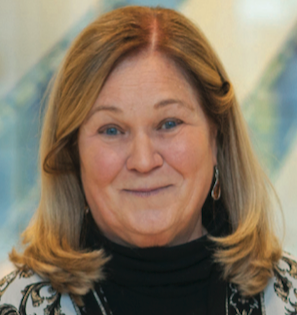Nursing professor offers students research, experiential learning opportunities, especially with vulnerable populations
The health of an individual or a community is about much more than fighting disease or infection. Societal factors such education, economic standing, disability, substance use disorders and more contribute to an individual’s overall health. The lack of resources and supports in homes, neighborhoods and local governments create vulnerable populations that may struggle to maintain healthy outcomes.
Such vulnerable populations have been largely the focus of URI College of Nursing Professor Diane Martins’ research and scholarly work throughout much of her career. She has studied health care experiences of the homeless population, analyzed food insufficiency and hunger with homeless families, and advocated for governmental food assistance programs to expand access to healthy foods, among other projects. And she has done most of her work with the assistance of her students, dedicating herself to increasing nursing students’ knowledge of healthcare and an appreciation for the challenges of vulnerable populations.
“Students have the opportunity to understand there are many factors that result in people having poor health outcomes, and those factors are much more than just behavioral choices, but rather some of those social conditions in our society such as poverty, housing, education, racism and things like that,” said Martins who teaches, among other classes, a course on the social determinants of health. “The more I can let students understand that, the better it is for them. If we can step back and look instead at those social factors that cause ill health, it helps to reduce the stigma surrounding those health outcomes.”
Martins, who was recently inducted as a Fellow in the American Academy of Nursing, is currently working in a partnership with the URI College of Pharmacy to help stem the ongoing opioid crisis in rural communities around Rhode Island. The “Community First Responders Program” seeks to educate rural communities about substance use disorder and opioid misuse, and provide resources to those communities to help address the opioid crisis. Martins and her students are conducting health screenings at rural community events such as the Washington County Fair and 4-H meetings, and teaching members of the community to recognize the signs of overdose and how to respond. The program also calls for the distribution of Naloxone free of charge to residents.
One main focus of Martins’ work for several years has been making improvements to the state Supplemental Nutrition Assistance Program (SNAP), formerly known as food stamps. Residents have traditionally been able to use SNAP benefits only for individual ingredients or packaged food items. Prepared foods were not eligible. Martins has been an advocate for the restaurant meals program, which allows SNAP recipients to buy prepared foods in some restaurants around the state, a critical benefit for some residents who may not have the resources to cook or store food.
“Someone who is homeless doesn’t have a kitchen or tools to cut vegetables or bread, and they don’t have anywhere to store perishable foods,” Martins said. “For the elderly or the disabled, it may be they don’t have that skillset with their hands to prepare food. So we created the restaurant meals program, and we need to expand it to more places.”
Martins’ students work hand-in-hand with her on research, advocacy and outreach, giving them a well-rounded experience not just in research, but in executing their discoveries and presenting their results. She has also taken groups of students to the Dominican Republic, giving them experience in non-traditional settings, and a new perspective that can be helpful in working with vulnerable populations.
“We found students felt they had a better understanding of their culturally diverse population; they understood what is what like to be the person who has the language barrier,” Martins said. “They were in a culture where their language was secondary, where their look or being was the outsider, so it was good for them to be not part of the dominant culture. It has an impact on them as a professional health care worker.”
Martins’ teams of students have benefited from her guidance and the hands-on experience her projects give them. Nearly all the students on her research teams have gone on to earn graduate degrees.
“Almost all my hunger research is done with a diverse team of students that reflects the community. Our health providers should look like the people we serve,” Martins said. “Experiential learning gives them a sense of how to give feedback; how to field the questions they’re going to get about their research. It’s good for them to see that because part of being a health provider is knowing you can’t go in with one agenda, but rather listen to the people you’re serving. It’s a great experience for them.”

